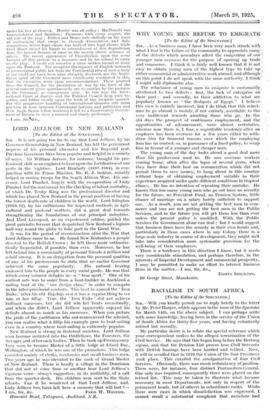LORD JELLICOE IN NEW ZEALAND
[To the Editor of the SPECTATOR.] Sni,—It is not going too far to say that Lord Jellicoe, by his Governor-Generalship in New Zealand, has left the permanent impress of his personal character and his Imperial zeal. Previous Governors have been popular and helpful in a variety of ways. Sir William Jervois, for instance, brought his pro- fessional skill as an engineer to bear upon the fortification of our ports in the 'eighties. Lord Ranfurly (1897-1904), in con- junction with his Prime Minister, Mr. R. J. Seddon, notably helped in raising troops for the South African War. His suc- cessor, Lord Plunket, largely with the co-operation of Lady Plunket, led the movement for the checking of infant mortality, of which Dr. Truby King was the professional director and which has placed New Zealand in the proud position of having the lowest death-rate of children in the world. Lord Islington (1910-12), by his enthusiasm for improved methods in agri- cultural and pastoral matters, did a great deal towards strengthening the foundations of our principal industries. And Lord Liverpool, as an experienced soldier, guided the great patriotic fervour that despatched New Zealand's legions half-way round the globe to take part in the Great War.
It was for the period of reconstruction after the War that Lord Jellicoe came to us. He found New Zealanders a people devoted to the British Crown ; he left them more enthusias- tically Imperialist, if possible, than ever. Moreover, he has left behind him a community of personal friends a million and a-half strong. It is no derogation from the personal qualities of any of his predecessors to state that no earlier Governor
achieved the same popularity. His natural bearing endeared him to the people in every social grade. He was that which every colonist delights in—a " true sport." One of his earliest acts was to order from a boat-builder in Auckland a sailing boat of the " one design class," in order to compete in the inter-provincial contests. This boat he named the Iron Duke,' after his old flagship, and it was a regular thing to see him at her tills,. True, the ' Iron Duke ' did not achieve brilliant successes, but she did win her heats occasionally, and when she didn't, Lord Jellicoe apparently enjoyed his defeats almost as much as his successes. When you picture the pride of the yachtsmen who out-manoeuvred the admiral, you can realize what a fillip his example gave to boat-sailing even in a country where boat-sailing is extremely popular.
New Zealand is strong in fraternal societies. Lord Jellicoe soon became initiated into the Oddfellows, the Foresters, the Savages and other such bodies. Then he took up Freemasonry Very soon he became Master of a little lodge at Island Bay, Wellington, of which he was one of the promoters. This lodge consisted mainly of clerks, mechanics and small business men. Two years ago he was elevated to the rank of Grand Master of New Zealand. There is hardly a village in the Dominion that did not at some time or another hear Lord Jellicoe's vigorous voice—always suggestive, in its audibility, of a call from the quarter-deck. His children were sent to the State schools. Can it be wondered at that Lord Jellicoe, and, Lady Jellicoe too, have left here a memory that will last ?-














































 Previous page
Previous page